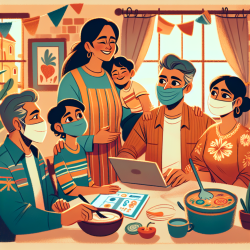Introduction
The COVID-19 pandemic brought unprecedented challenges to families worldwide, with Hispanic families in the United States facing unique stressors. The research article "Time at Home during the COVID-19 Pandemic: Findings from Focus Groups with Hispanic Parents" sheds light on how these families navigated the pandemic's challenges. This blog explores how practitioners can leverage these findings to improve outcomes for children and families in online therapy settings.
Key Themes from the Research
The study identified six key themes that emerged from focus groups with Hispanic parents:
- Family Time: Parents focused on spending quality time with their families, engaging in activities like watching movies, playing games, and sharing meals.
- Adaptation: Children adapted to the changes brought by the pandemic, with parents noting their resilience and ability to adjust to new routines.
- Physical Activity: Families engaged in physical activities together, such as walking and using exercise videos, despite pandemic restrictions.
- Screen Time: Children primarily entertained themselves with screens, which became a significant part of family time.
- Media Coverage: COVID-19 news was accessible in homes, with parents discussing its impact on family perceptions of the pandemic.
- Future Concerns: Parents expressed worries about the virus's long-term effects and the future for their children.
Implications for Practitioners
Practitioners working with Hispanic families can draw valuable insights from these themes to enhance their practice:
- Leverage Family Strengths: Emphasize the importance of family time and connectedness in therapy sessions. Encourage families to continue nurturing relationships and maintaining routines that promote resilience.
- Support Adaptation: Recognize children's adaptability as a strength. Provide strategies to help families build on this resilience, particularly in adjusting to new educational and social environments.
- Promote Physical Activity: Encourage families to incorporate physical activities into their routines. This can be a shared family experience that promotes health and well-being.
- Manage Screen Time: Help families find a balance between screen time and other activities. Explore ways to use technology positively, such as virtual family activities.
- Address Media Impact: Discuss the influence of media coverage on family stress and anxiety. Offer strategies for managing media consumption and fostering open communication about pandemic-related concerns.
- Plan for the Future: Assist families in developing coping strategies for ongoing uncertainties. Encourage discussions about future goals and aspirations to alleviate anxiety.
Encouraging Further Research
While this study provides valuable insights, further research is needed to explore the long-term effects of the pandemic on Hispanic families and the role of family strengths in mitigating stress. Practitioners are encouraged to engage in ongoing research and collaboration to enhance their understanding and support for diverse families.
To read the original research paper, please follow this link: Time at Home during the COVID-19 Pandemic: Findings from Focus Groups with Hispanic Parents.










